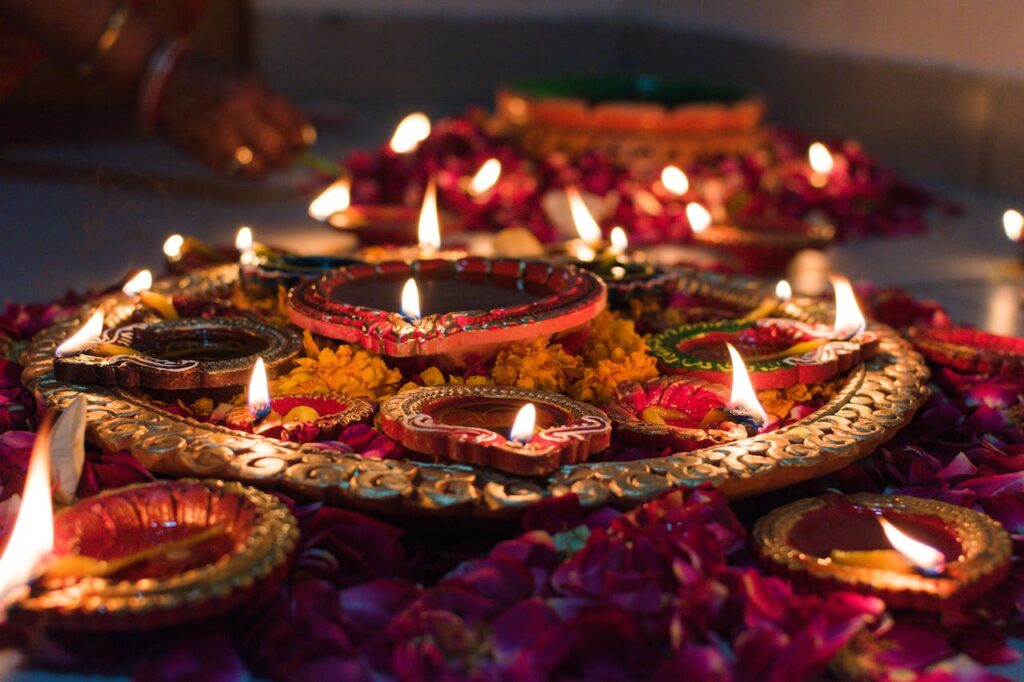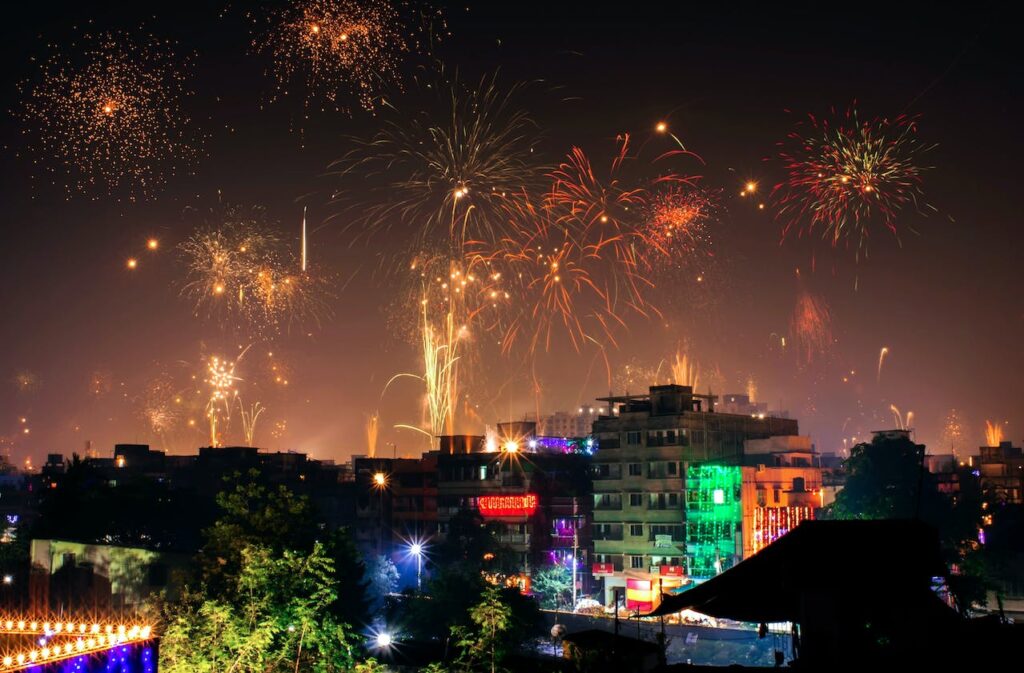Diwali, also known as Deepavali, is one of the most celebrated and revered festivals in India and among Hindus worldwide. Often referred to as the “Festival of Lights,” Diwali holds a special place in the hearts of millions. Beyond the spectacular display of lamps and fireworks, this festival is a profound expression of the triumph of light over darkness, good over evil, and knowledge over ignorance. In this blog, we will dive deep into the essence of Diwali, exploring its history, significance, rituals, and the profound symbolism behind the mesmerizing lights that adorn homes during this joyous occasion.
Page Contents
The History of Diwali
To truly understand the significance of Diwali, we must delve into its historical roots. The festival has a rich and diverse history, with various interpretations and legends surrounding its origin.
One of the most popular legends associated with Diwali is the return of Lord Rama to Ayodhya after defeating the demon king Ravana. According to the ancient Indian epic, the Ramayana, Lord Rama, his wife Sita, and his loyal brother Lakshmana spent 14 years in exile, during which they faced numerous trials and tribulations. On their return to Ayodhya, the people of the kingdom illuminated their homes with oil lamps to welcome their beloved prince and symbolize the victory of righteousness over evil.
Another legend revolves around Lord Krishna, who is said to have vanquished the demon Narakasura on the day of Diwali, freeing the imprisoned princesses and restoring peace. This event is celebrated as Naraka Chaturdashi or Choti Diwali, which falls a day before the main Diwali festival.
Apart from these legends, Diwali also holds significance for Jains, as it marks the attainment of nirvana by Lord Mahavira. Sikhs, on the other hand, commemorate Diwali as Bandi Chhor Divas, signifying the release of Guru Hargobind Ji from imprisonment in the Gwalior Fort.
The underlying theme in all these legends is the victory of good over evil, the return of light after darkness, and the restoration of peace and harmony. Diwali, therefore, encapsulates a universal message that transcends religious and cultural boundaries.
Read Also : Scotland’s Enchanted Emblem: The Unicorn as the National Animal
The Significance of Diwali
At its core, Diwali represents the triumph of light over darkness and knowledge over ignorance. It is a time for introspection, self-improvement, and the renewal of relationships. Here are some key aspects of the festival’s significance:
The Triumph of Good Over Evil: Diwali symbolizes the victory of righteousness and virtue over malevolence and wickedness. It reminds us that, no matter how challenging the circumstances, goodness ultimately prevails.
The Celebration of Knowledge: Diwali is often associated with the worship of Goddess Saraswati, the deity of knowledge, music, and art. It encourages the pursuit of wisdom and enlightenment.
Family and Community Bonding: Families come together during Diwali, exchanging gifts, sharing meals, and lighting lamps. It is a time to strengthen bonds and build cherished memories with loved ones.
Economic Prosperity: Diwali is also considered an auspicious time for businesses. It is common for traders and merchants to perform special pujas (rituals) to seek the blessings of Goddess Lakshmi, the goddess of wealth and prosperity.
Inner Cleansing: Diwali is an opportunity for individuals to cleanse their homes and hearts. It is customary to clean and decorate homes, which also signifies removing negative influences from one’s life.

The Rituals and Traditions
Diwali is celebrated with a myriad of rituals and traditions, each with its unique significance. While these customs may vary from region to region and from one household to another, some common practices include:
Lighting Oil Lamps (Diyas and Deepams): The most iconic aspect of Diwali is the lighting of oil lamps, known as diyas or deepams. These lamps are believed to represent the dispelling of darkness and the spread of positivity and enlightenment.
Rangoli: Beautiful and intricate patterns made with colored powders, flower petals, or rice are created at the entrance of homes to welcome guests and add to the festive ambiance.
Fireworks: Fireworks are an integral part of Diwali celebrations, illuminating the night sky with vibrant colors and adding to the festive spirit. However, in recent times, there has been growing awareness about the environmental impact of fireworks.
Puja (Prayer): People offer prayers to deities, seek blessings, and perform rituals that vary based on their traditions and beliefs. In North India, the tradition of Govardhan Puja is observed.
Exchanging Gifts: Diwali is a time for exchanging gifts and sweets with family, friends, and neighbors. This gesture strengthens social bonds and expresses love and affection.
Sweets and Special Diwali Dishes: A wide array of sweets and delicious dishes are prepared during Diwali, ranging from traditional Indian sweets like ladoos and jalebis to savory treats like samosas and pakoras.
New Clothes: Many people buy new clothes for themselves and their families to wear during Diwali, symbolizing a fresh start and the shedding of old, negative energy.
The Profound Symbolism of Lights
The central theme of Diwali as the “Festival of Lights” holds a deeper, metaphorical meaning that goes beyond the visual spectacle. The lights represent the triumph of light, wisdom, and knowledge over ignorance, and they are symbolic in several ways:
Dispelling Darkness: The lighting of lamps signifies the removal of darkness and the triumph of good over evil. It reminds us that, even in the darkest times, a single ray of hope can dispel the gloom.
Inner Illumination: Diwali encourages individuals to seek inner illumination and knowledge. It’s a reminder that just as lamps light up the external world, knowledge and wisdom illuminate our minds.
Unity in Diversity: The multitude of lamps lit during Diwali represents the unity in diversity, as people of various faiths and cultures come together to celebrate the festival.
Triumph of Righteousness: The brightness of the lamps symbolizes the victory of righteousness and virtue over wickedness and ignorance, inspiring individuals to lead a virtuous life.
Overcoming Fear: In many cultures, lighting lamps is believed to ward off evil spirits and negative energies, offering protection and peace.
The Environmental Aspect of Diwali
As the world becomes increasingly conscious of environmental issues, there has been growing concern about the environmental impact of Diwali celebrations, particularly due to the widespread use of fireworks. While fireworks are a stunning part of the festival, they release harmful pollutants into the atmosphere, contributing to air pollution and causing distress to those with respiratory problems. Many organizations and individuals are now advocating for eco-friendly and noiseless celebrations, focusing on the use of traditional lamps and sustainable decorations.
Eco-conscious Diwali celebrations can involve
Limiting Firework Usage: Reducing or eliminating the use of fireworks can significantly reduce pollution and noise, contributing to a cleaner and quieter celebration.
Sustainable Decorations: Using eco-friendly materials for rangoli designs and decorations, such as flower petals, leaves, and natural dyes, can promote a greener Diwali.
Efficient Lighting: Opting for energy-efficient LED lamps and candles can save energy and reduce the carbon footprint of the festivities.
Charity and Philanthropy: Many people choose to celebrate Diwali by helping the less fortunate, which aligns with the spirit of giving and compassion that the festival embodies.

Diwali Around the World
While Diwali is most fervently celebrated in India, it is not confined to the subcontinent. Over the years, the festival has spread its radiant glow to various parts of the world, where it is embraced by diverse communities. Here’s a glimpse of how Diwali is celebrated in different regions:
India: Diwali is celebrated with unmatched fervor across India. Each state and region has its unique customs and traditions, from the grand celebrations in North India to the vibrant carnivals in South India.
Nepal: Diwali is celebrated as Tihar in Nepal, and it is one of the country’s most significant festivals. It involves the worship of various animals, including cows, dogs, and crows, as well as lamps and offerings to the goddess Laxmi.
Sri Lanka: The Tamil Hindu community in Sri Lanka celebrates Diwali with grand processions, lighting lamps, and sharing festive meals. The festival symbolizes the victory of good over evil.
Malaysia and Singapore: The Indian diaspora in Malaysia and Singapore enthusiastically celebrates Diwali. Streets are illuminated with colorful lights, and various cultural performances and rituals are held.
The United Kingdom: Diwali has gained recognition in the United Kingdom, where the Indian diaspora organizes grand celebrations, including cultural events, processions, and the lighting of lamps in Trafalgar Square, London.
United States and Canada: Diwali is celebrated by Indian communities in the United States and Canada with enthusiasm. It includes prayers, cultural programs, and the lighting of lamps.
Fiji and Mauritius: The Indo-Fijian and Indo-Mauritian communities celebrate Diwali with great enthusiasm, similar to their counterparts in India. The festival is marked by prayers, lighting lamps, and the exchange of sweets.
Diwali in the Modern World
In today’s fast-paced and interconnected world, Diwali continues to be a symbol of hope, unity, and shared traditions. The festival has transcended boundaries and found a place in the hearts of people from diverse backgrounds. Its message of light, love, and the triumph of good over evil resonates with the universal human spirit. It’s a time for people to take a break from their busy lives, come together, and celebrate the joy of togetherness.
Diwali also serves as an opportunity for reflection and renewal. Many people use this time to set personal goals, make resolutions, and strive for self-improvement. Just as the lamps dispel darkness, the festival encourages individuals to seek the light of knowledge and self-awareness.
Read Also : 7 Must-Visit Destinations for Foodies Around the World
The True Essence of Diwali
At its core, Diwali is a celebration of life and its infinite possibilities. It reminds us that even in the darkest of times, a single spark of light can lead us to a path of illumination. It is a festival that encourages us to introspect, cleanse our minds and homes, and reach out to others with love and compassion.
As we light the lamps and celebrate Diwali, let us not only illuminate our homes but also our hearts and souls. Let us remember the profound symbolism behind the lights and carry the message of good over evil, knowledge over ignorance, and love over hatred throughout the year. Diwali is not just a festival; it is a way of life, a reminder to always choose the path of light and righteousness.
In conclusion, the Hindu festival of Diwali, known as the “Festival of Lights,” is a vibrant and deeply meaningful celebration that has transcended borders and resonates with people from all walks of life. It is a time for reflection, unity, and the triumph of light and knowledge over darkness and ignorance. As we gather with our loved ones to light the diyas and partake in the festivities, let us not only celebrate the external beauty of the lights but also the inner illumination and the timeless message of hope and goodness that Diwali embodies. Happy Diwali!


